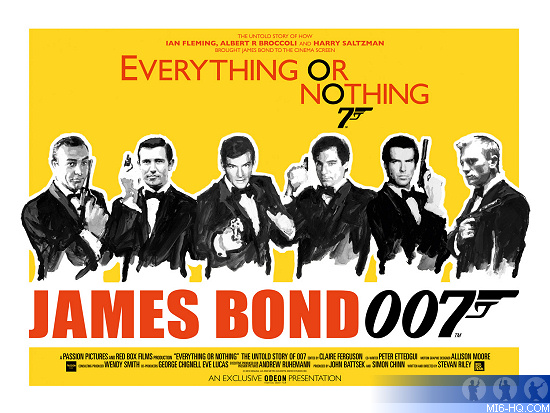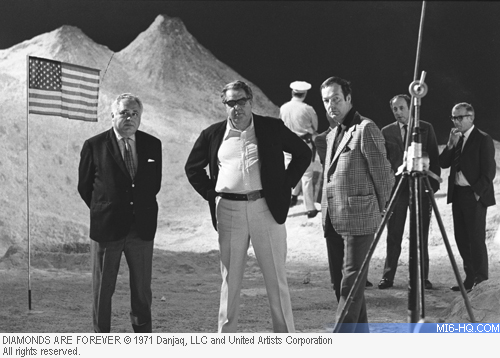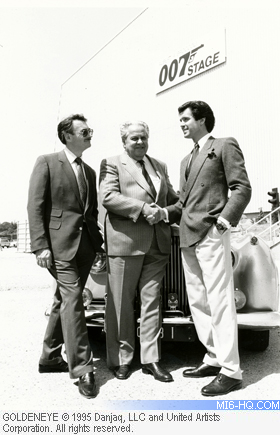 |
| |
MI6 caught up with 'Everything Or Nothing' director Stevan Riley to speak about reliving the past and recording 50 years of Bond...
|
|
Everything Or Nothing Interview
6th November 2012
You first screened the documentary, "Everything or Nothing" in front of a huge crowd of Bond alumni; was it quite daunting taking on such a monumental project?
Well, absolutely. You know the further I got into the project, the more I realized what a big institution I was dealing with. A real cultural phenomenon. And I did ask myself if I'd bitten off more than I could chew. It was really quite ambitious to try and fit all that in. Then you've got to factor in everybody who has an opinion on Bond. I suppose I was expecting there to be a few more critics of the film, really. You've missed this or you've missed that. I'm glad that people think that it's covered a lot of the ground.
Making a documentary like this, how do you keep it fresh when the story and the subject matter is so well known to the fans?
Well, I recognised that there were clearly a lot of die-hard fans who know their Bond back to front, but I was also aware that I had to pitch it for people who didn't know Bond at all. So, there was obviously going to be a lot of ground that was re-trodden by some of the stories that were already out there, but then I thought, how can I find a nice original and emotional take on it, to present it in a novel fashion that wasn't a straight cut documentary and that felt like you were a bit more immersed in an honest story.

Above: Teaser poster for the Odeon cinema release of "Everything Or Nothing" in the UK.
|
It certainly comes across as much more of a human story.
I think that it's nice to do the informative stuff with documentaries, where you pick something up and learn on route, I think that's the preserve of documentaries anyway. But I was just keen to tell the emotional narrative as well as just the story of Bond, to help show that there are real individuals behind it and real relationships, ups, downs, fall outs, break ups and make ups, with a lot of emotion involved. I felt that was important and that now was the time to tell it, really.
How familiar with Bond's history were you to begin with? Did you have a starting point for telling the story?
Well, I suppose the only premise I had was "how the hell did this last so long?" I had this notion that it is unprecedented, that it is unique within moviemaking in that no other series has managed to last so long. Then it was a case of seeing what might back that up. Sure enough, there were loads of obstacles in the way. I'm actually a bit of a nerd when it comes to preproduction and research, and I just wanted to make sure that I read everything that was out there, watched every clip of film. I was probably a bit too thorough, but I just wanted to make sure nothing slipped through the net!
You have to be thorough when Bond is so precious to so many people. You really can't afford to get it wrong. After all, Bond is a part of our national identity, in many ways.
Well, I'm not really that much of a severe patriot, or a Bond fan for that matter. But I'm enough of one to be curious enough to do this, to really get to the root of what makes Bond tick, what makes it so successful, and mix in an affectionate tribute to Bond at the same time. Bond is one of our biggest exports - ironically, originally produced by an American and a Canadian - but it is a great British export, and I wanted to document it properly and create a proper legacy piece.

Above: Harry Saltzman, Cubby Broccoli and Guy Hamilton on set of "Diamonds Are Forever".
|
Last year London faced riots and violent protests, whereas this year, we've had the Queen's Jubilee, hosting the Olympic games and now Bond celebrating his 50th anniversary. All this has contributed to a resurgence in British pride. Would you say that Bond, in his way, has helped to stabilise the country a little bit?
I really think so, and you know, looking through the archive footage and you see that first generation of Bond fans - I'm talking about Fleming's generation - and that deep attachment to what it was like to be English, even when there were questions that were being asked post-empire. What does being English mean? Fleming, I think, his whole attempt in writing the books was to help stabilise and to protect Britain's failing standing on the World stage. Those first books were a real rallying cry, a rallying cry for Britishness and the things we should be proud of.
In many ways, Bond was Fleming's response to America's rising power. It was his way of saying that, you may have helped us to win the War, you may have helped to re-stabilise our economy, but we still have panache and class and you still need Great Britain.
I think there's that sense of resourcefulness, that sort of "boys own" mentality, that shrewd, diplomatic tradition that is at the heart of the British approach and that I think Bond embodies... I think there's this quiet sense of pride that the films embody. Obviously, when you look at the Olympics and Bond being a part of that showcase, he's totemic of everything that's best about this country, this island.
What's your reaction to the way that this film has been received so far?
SR: I mean really, it's been just great. In some respects I'm still a little bit shell-shocked. I thought there might be a few more kickings. I must admit that it's been especially from the real Bond fans. Just getting their comments back is amazing.
It must be quite something to see real fans responding in this way.
Well, I thought they were going to be our toughest crowd! You know, if they're on side then I thought great, job done. Really, that was the biggest thrill.
Obviously, it's been perfect timing with the anniversary. Did you get a chance to get involved with those events?
There was a lot of stuff I missed. I mean I even missed the Barbican exhibition. All these great things were going on, but I was so involved with making the film that I really didn't have the time. However, I think that people will be able to look back on this as commemorative piece, which they will be able to revisit in years to come.
You managed to elicit some very personal responses from the Bond actors, who showed a side to themselves we rarely see.
Well, I kind of have my own barometer of what I look for in the process as a filmmaker, what I respond to, what I want in the film, and it's really those honest moments - that point where the interviewee really forgets about the camera, is engaged in what they're doing, engaged in that story, you know those moments and they're quite obvious when they appear. I didn't want this to feel like anything other than an intimate chat and to get people - in the nicest sense possible - when their guard's down, and they're just talking from the heart. If you stack those moments up, you end up with a really honest piece.
|
|

Above: Michael Wilson and Cubby Broccoli announce Pierce Brosnan as James Bond #5.
|
The editing is truly one of the most striking things about the film?
Yeah, well, editing is a real obsession for me. Even just down to the single frame. Trying to get it exactly right and timing it to the music. It's a preoccupation that I've got and I really think that it helps with the rhythm of the piece.
Was it this attention to detail that made EON approach you to do this film?
Well, quite possibly. I mean, the cricket film I did ["Fire In Babylon"] was a big history - although "Everything On Nothing covers a lot more years. So I think there was some merit in employing a similar use of music and rhythm and pace just to help audiences along through the timeline.
The other interesting thing was the introduction to the film with the Bond stand in, segueing into Daniel Craig in his tuxedo in Casino Royale. In some ways, you managed to shoot your own Bond film.
Well the pressure was on for that, because we were running out of time. That was actually filmed last, the very last thing that I ended up filming, but that was good fun thinking how do we make this work seamlessly as possible so that we can introduce the image of Daniel Craig. I wanted to do something that was a pre-title sequence in a way to actually introduce Daniel's Bond. Bearing in mind, of course, that the early part of the film tackles Ian Fleming, it becomes fairly emersed in the early period. So there's a few reasons for that opening sequence a) to do a pre-title sequence, sort of a nod to the Bond films before the gunbarrel, and b) to introduce Daniel, the modern Bond, as we wouldn't be seeing him again until the end of the film.
You mention the gunbarrel for this, and we have to say it's the best one we've seen.
I'm glad to hear that! Yes, I was working with Alison Moore who does the graphics for the film, and she was actually great throughout. She was a huge support as we had a lot to do in a limited time. We had a lot to do graphics wise on the film and she really came through. We talked through various ideas about what we could do, to make it happen and she went off and worked her magic. It turned out rather nicely, I think.
Many thanks to Stevan Riley and Ben Williams.